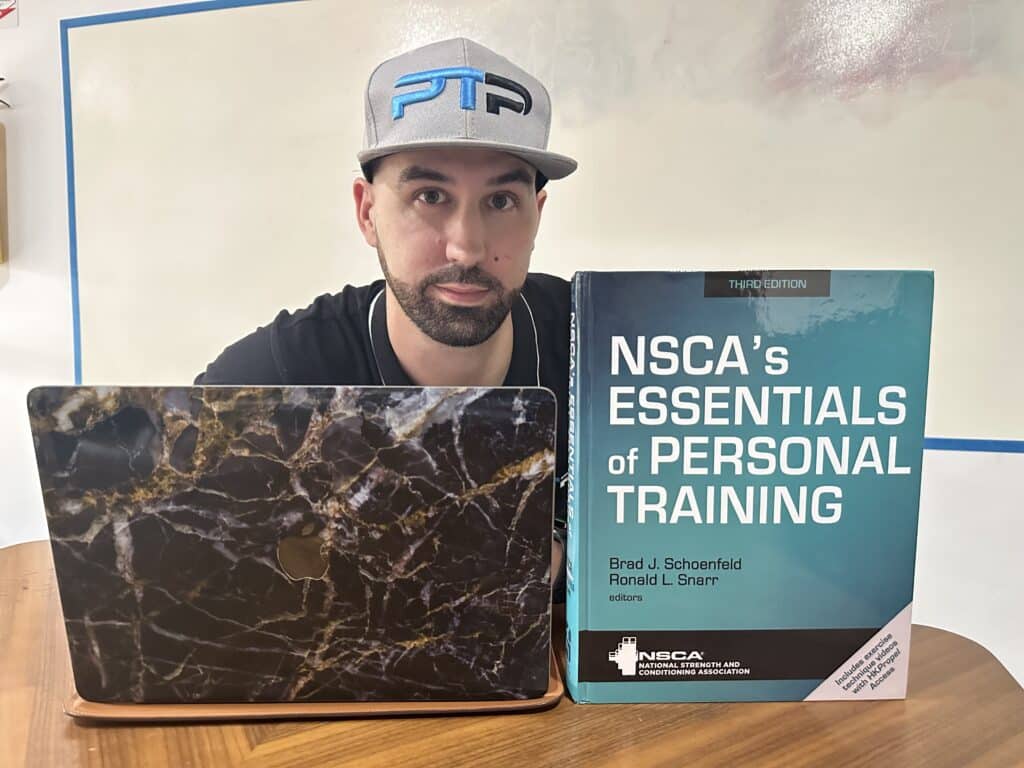
Hello, and welcome to my comprehensive review of the NSCA personal trainer certification. I write this breakdown after taking the NSCA-CPT course and passing the exam. I use my experience as an NSCA certified personal trainer for over 10 years.
Our team at PTPioneer includes trainers and coaches certified through major organizations, so we have a good standpoint from which to compare fitness certifications.
On this page, I cover these topics for the NSCA CPT:
- Organization information: pricing, packages, prerequisites
- Quality of the program and textbook
- Pros and Cons, is the NSCA Personal Training Certification the right cert for you?
- How this compares to other personal training programs
After you have read through this NSCA CPT Review, you can truly decide if this is the right certification for you.
Cut your Personal Trainer Certification study time in half with premium study materials from Trainer Academy for the NSCA CPT and more.
Use the code PTPJULY to receive between 35% and 50% (depending on the program) off the Trainer Academy MVP Study System. Get the trial for any of their study systems here and check out my review for Trainer Academy here.
If you have any questions about which certification is best for you, I recommend you take the quiz to find out which CPT certification is the best fit for you to obtain.
Let’s go ahead and dive into all things NSCA and Certifications for Personal Training!
What is the NSCA Personal Training Certification?
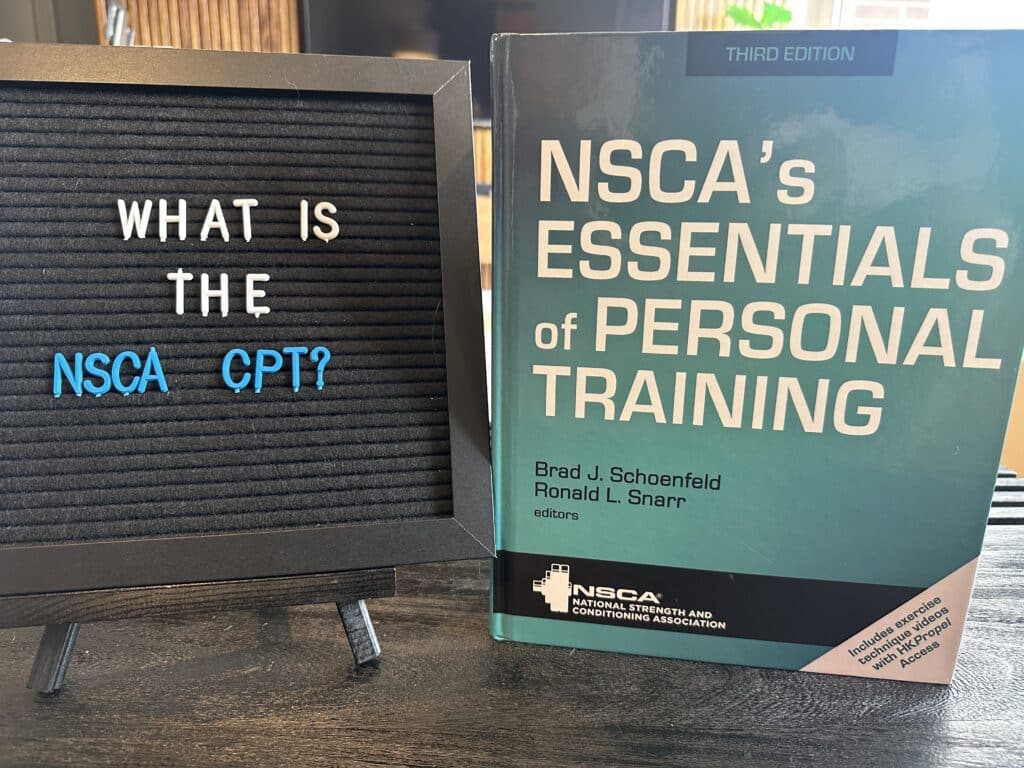
The National Strength and Conditioning Association Certified Personal Trainer certificate (NSCA-CPT) is a top certification for personal training within the entire fitness industry. The name NSCA garners a lot of respect, with the main focus coming from the strength and conditioning field.
A CPT certificate means that you are expected to have basic knowledge in prescribing safe and effective exercise programs as a personal trainer.
NSCA certified personal trainers are well trained in all topics relating to health and fitness. This certification guarantees a solid personal trainer salary once you find work.
The NSCA CPT certification stands out in the industry and the other top dogs by having the NCCA accreditation. This is the gold standard for the industry and allows employers to know the quality of certifications.
The NCCA, or the National Commission for Certifying Agencies, is a nationally recognized organization that ensures certification exams cover the requirements to test individuals on the information needed in the job.
Other top certifications like ACE or NASM also have the NCCA accreditation, so it’s not just the NSCA. However, it still sets them apart and validates the certification in the industry.
The exam and the study materials are sold separately, which is confusing compared to other certification organization packages.
I expand on the pricing options later on the page but know that a basic exam package comes in at $435 for non-members and $300 for members.
NSCA membership is a great value to consider, not just for the discounts but also for the benefits you get after certification, which may advance your training abilities.
When considering your career opportunities after getting certified by NSCA, it is important to note that your potential jobs will not simply be limited to the gym.
It is common to see NSCA CPT-certified individuals working in places other than gym settings, like high school coaching, football strength coaching, and similar fields. You should not limit yourself to your certification from this excellent strength and conditioning organization.
This CPT certification ranks among the top personal trainer certifications that we have reviewed.

NSCA CPT General Information
- Exam cost: $435 (non-member price)
- Study material cost: $435-$1000+
- Prerequisites: CPR/AED, High School Diploma
- Exam passing score: 70%
- Exam pass rate: 72% (2018 data)
- Average completion time: 6 months
NSCA credibility and reputation
Let’s look at what NSCA stands for as an organization.
NSCA is short for the National Strength and Conditioning Association.
This non-profit organization offers the best personal training certifications focused on strength and conditioning in the entire industry.
They are well-renowned for their Certified Strength and Conditioning Specialist certification (NSCA-CSCS), but they have a presence in all aspects of fitness in a top position.
For a more comprehensive look at the top certifying fitness organizations in the industry, check out my article breaking down the best personal trainer certifications.
It may be beneficial to compare and contrast the NSCA CSCS vs CPT certifications to know which one is best for you personally.
The NSCA CSCS is regarded as the best strength and conditioning certification. You will find just about all assistant strength coaches, college strength coaches, and professional coaches with this type of certification.
We even offer an NSCA CSCS free study guide and practice exam for those that are interested.
There are many great strength and conditioning certifications to consider, but NSCA is the best-known one in the industry.
The NSCA leads in practical application, research, continuing education, and networking opportunities while also having a large 60,000 member and certified professional count worldwide.
Most certifications through NSCA are NCCA accredited and thus are held to a high standard, ensuring the quality of materials.
For more help choosing from the best NCCA accredited certifications, I highly recommend you take my quiz below to determine which CPT is right for you.
This organization aims to work with the general population’s health and aims to improve athletic performance.
Regarding athletes’ training, I believe this is perhaps the best option for a personal trainer or future strength and conditioning coach to pursue.
All of these certifications are well-done and will lead to a great personal trainer salary.
NSCA also has great certifications for military training personnel, ex-military personnel, fire and rescue, and law enforcement.
So, they have a great and varied set of objectives and possibilities with their certifications, like the aforementioned tactical strength coach cert.
Let’s look into the details and benefits of NSCA membership next!
NSCA Membership
Before diving into the CPT certification, it is important to know everything you can get through membership with the NSCA. There are three total options for membership.
Exclusive PTP CPT Offers |
||
|---|---|---|
Most Popular Cert | Best Online NCCA Cert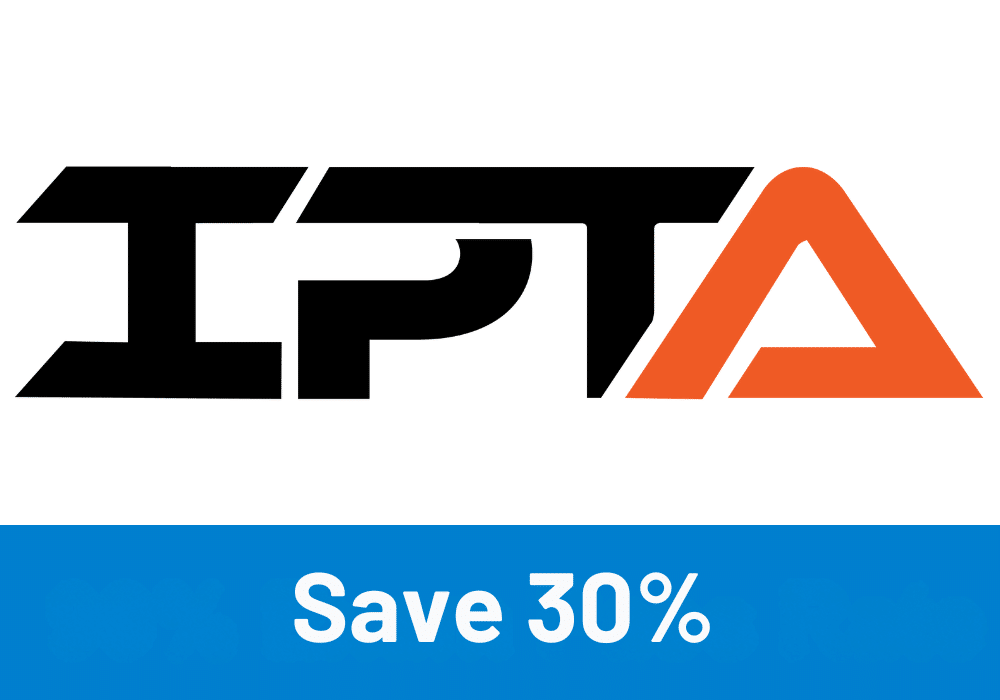 | Best Study Materials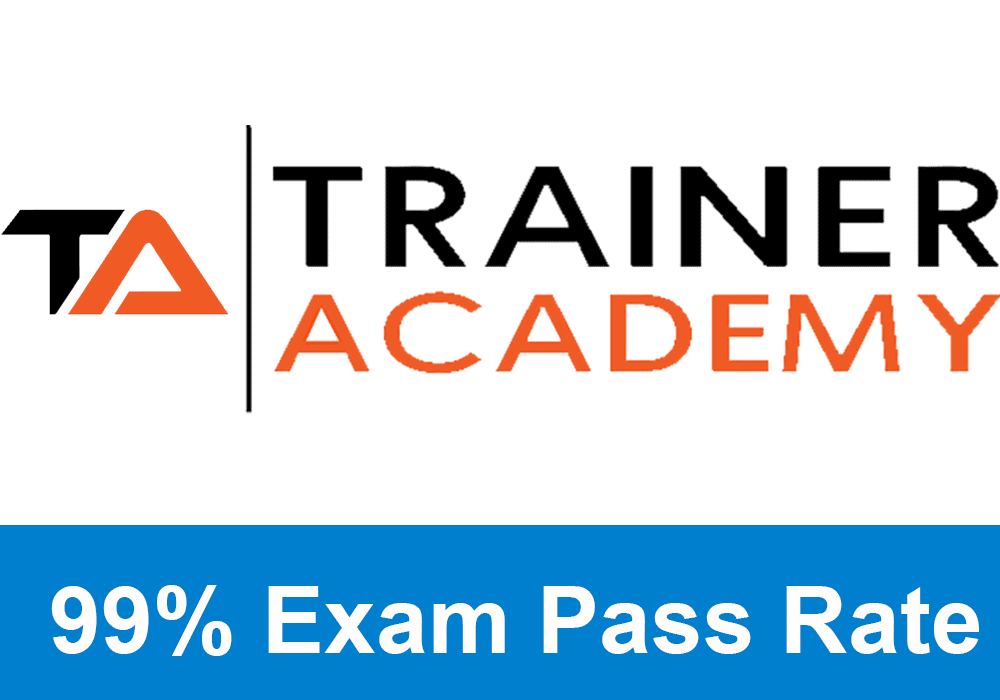 |
Gold Standard Cert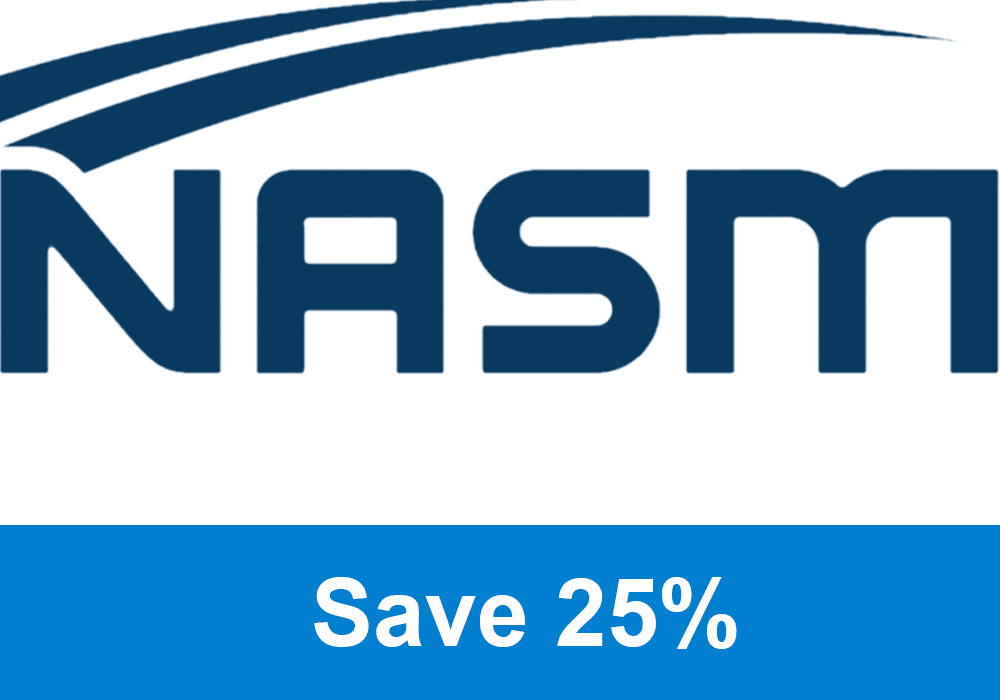 | A Good Option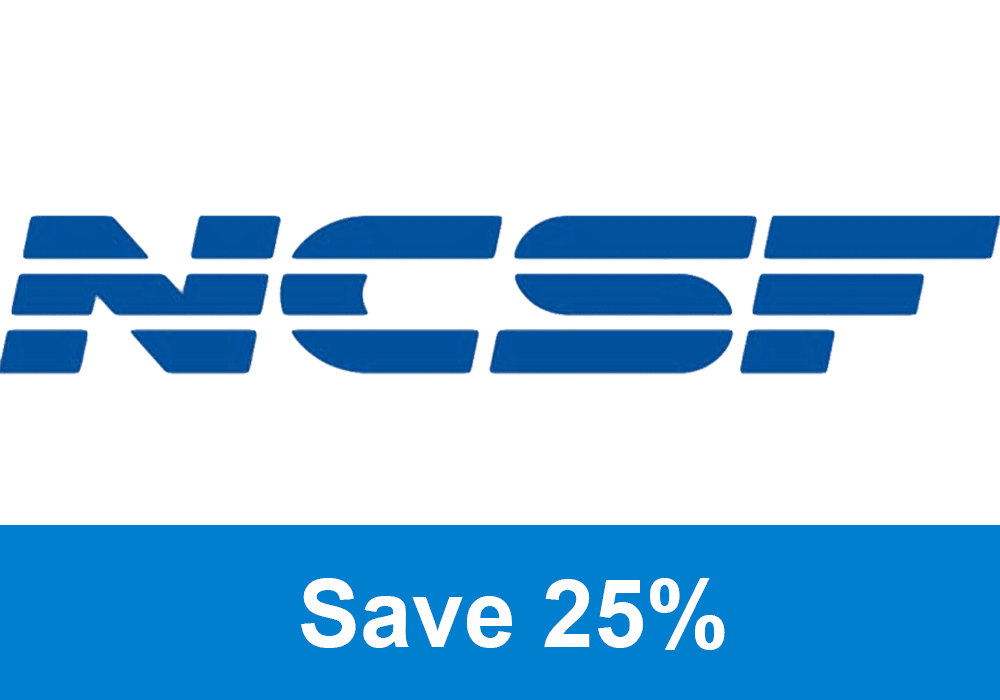 | Best CPT for you?  |
With all of these membership options, you will gain access to some key NSCA benefits, like:
- Journals Access
- Member Only Content
- Community Networking
- Discounts
- Member Perks
- Free CEU Access
- NSCA TV Access
First is the NSCA student membership, which is $70 every year.
This is available for full-time undergraduate and graduate students and must be verified to receive this valuable membership for this low price.
Second, there is the professional membership, which is $130 a year.
This full access is given to professionals or future professionals working on current certifications through the NSCA. The discounts are quite valuable, and the price is reasonable for the industry.
The final membership type is the CPI membership, which costs $299.17 annually.
This final membership is quite valuable, as it includes everything in the other memberships, plus the important features of NSCA liability insurance and more.
Personal training insurance is a valuable thing to include with this membership. It is definitely worthwhile for a new trainer who knows they will retain a good number of clients.
Is the NSCA-CPT worth it?
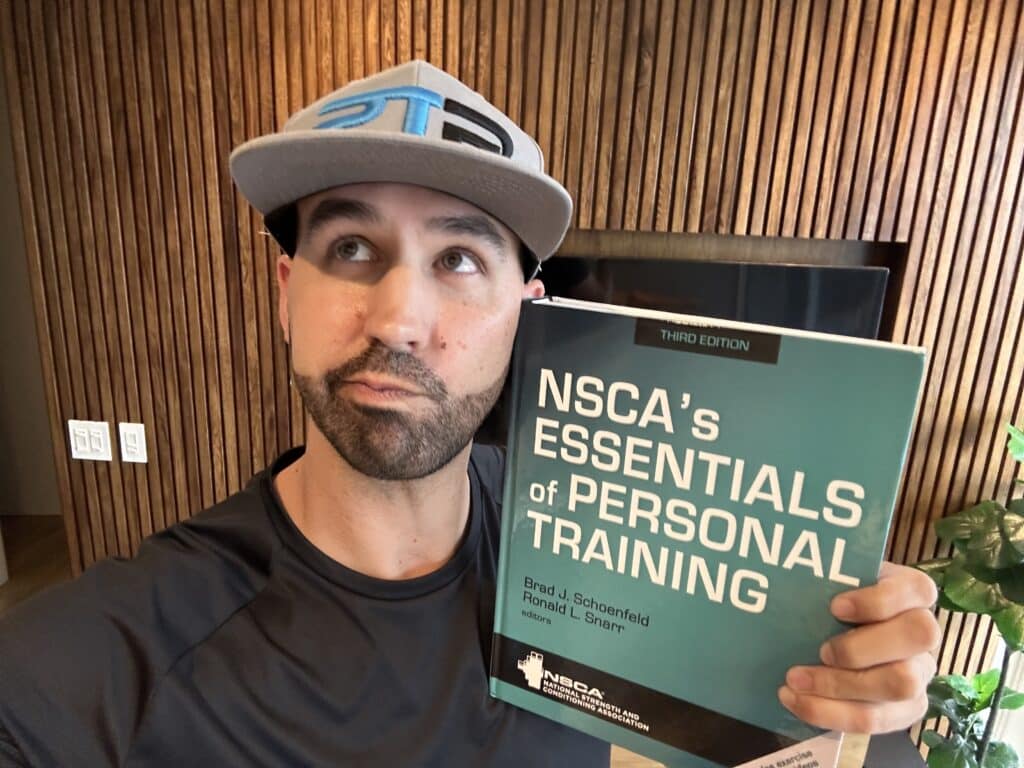
Yes, the NSCA-CPT is worth it for those looking for a great personal training certification, especially if you are interested in athletic performance.
NSCA has some of the most comprehensive curriculum of any CPT, and impressive resources with their membership once you join the organization.
Additionally, the base exam price is incredibly reasonable compared to other main organizations like NASM or ISSA.
- Industry-leading scene and practical application
- A densely-packed over a 600-page textbook that blows others out of the water
- Great lead-in for future advanced certifications
- Respect of being one of the top certifying organizations in the industry
- Lack of online video and audio from the organization
- Fewer practice questions are offered than desired
- Exam not included in study packages
NSCA vs. other top exercise certifications
There are a variety of top training certifications offered by ISSA, NASM, ACE, and ACSM. Each of these options shines in different aspects.
ISSA stands out as the best online training certification. I like how they include business skills in their certifications, and that’s probably why ISSA trainers tend to have higher average salaries than those from other organizations.
NASM is the most well-known institution and excels in the field of corrective exercise.
ACE gives trainers some of the best behavioral coaching techniques in their CPT.
ACSM is the oldest institution and, next to NSCA, is known for its exercise science research.
Who is the certification meant for?
The NSCA Certified Personal Trainer is geared towards individuals who want to train clients in all aspects of fitness. While NSCA does have its roots in athletics, this is not a strength and conditioning coach credential.
- Athletic performance careers
- Knowledge of complex program design
- No simple program design framework
- Exercise science deeper than needed
NSCA CPT course costs and options
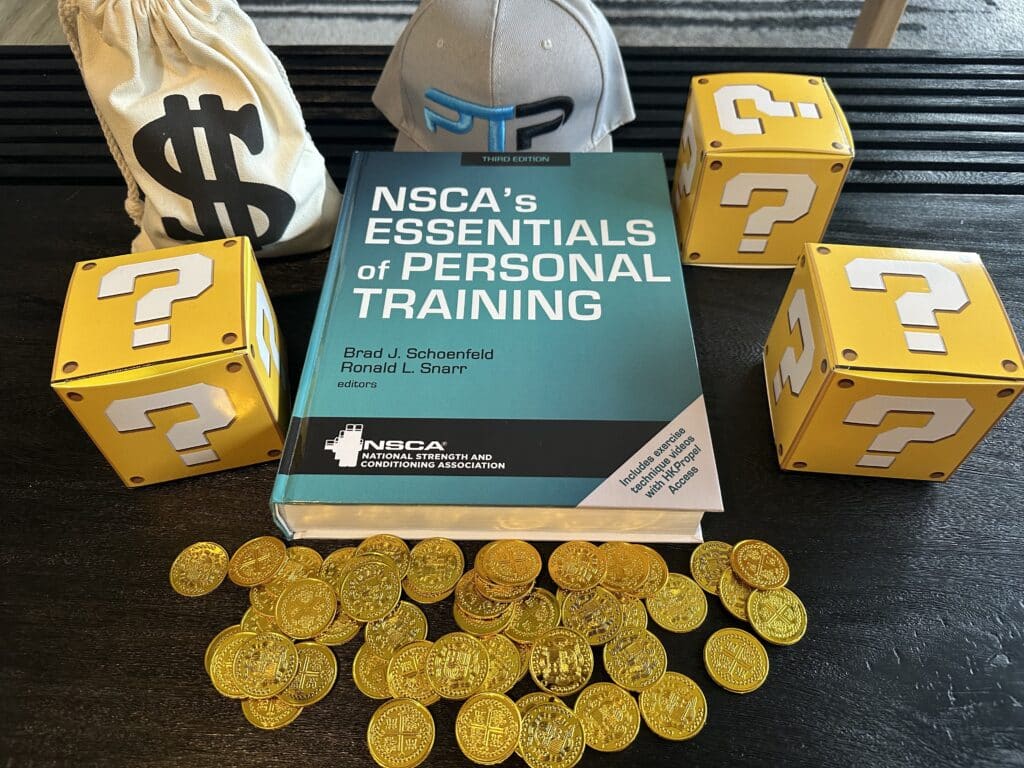
There are four options to purchase, one of which is strictly an exam-only option, and the other three are different study packages that do not have the exam included.
So, remember that you have to purchase the exam and then separately purchase the study materials, essentially making a study program into two separate purchases. This is a slight negative, but it still has all of the necessary options with other organizations.
Exam-Only Package
The NSCA CPT exam registration fee changes depending on whether the candidate attains a membership or not.
The non-member rate is a hefty price of $435, while simply becoming a member reduces this price to $300.
This alone makes the membership worth it, since the difference is essentially that exact amount.
NSCA-CPT Digital Package
The NSCA CPT Digital package is here to help people become familiar with the style of questioning and the scope of the materials included in the certification exam.
It simply includes an NSCA CPT study guide and more than 200 practice questions to assist with exam reading.
The estimated value is $214, but it may be purchased for a non-member price of $202 or a member price of $152.
NSCA CPT Essential Package
This is ideal for someone already familiar with exercise science and probably has a degree in the field.
It includes just the basic materials needed for studying: the NSCA textbook, Essentials of Personal Training, the NSCA CPT Study Guide, and over 200 practice questions.
The estimated value of this package is $323, but it can be purchased by a non-member for $314.45 and by a member for $255.55.
NSCA CPT Essential Plus Package
This final package is the most comprehensive. It is intended for people with little to no exercise science experience or simply wishing to have the most NSCA study materials possible to guarantee a pass.
This package includes the Essentials of Personal Training NSCA personal training textbook, the 3rd Edition Exercise Technique Manual, the NSCA CPT Study Guide, over 200 practice questions for the certified personal trainer exam, and some more small items (certification handbook).
The package is estimated at $567, but it can be purchased for a non-member price of $541.50 or a member price of $479.75.
So, is NSCA worth the money?
NSCA has prices up there with the best in the industry for their study packages and exam together.
NSCA is 100% worth the prices they set for their materials as an NCCA accredited program, and when partnered with the NSCA membership costs and benefits, it is beyond worth it.
You can kickstart your NSCA CPT studies today by checking out my free NSCA study guide and practice test, giving you a better feel about what to expect from NSCA.
Suppose you are stressed about spending money and potentially failing the NSCA exam. In that case, I recommend purchasing a third-party study package with an exam pass guarantee, such as the Trainer Academy NSCA CPT MVP Study Bundle.
My PTP students report cutting their NSCA study time and effort in half with Trainer Academy.
Benefit from the Exam Pass Guarantee and Retake Fee Guarantee. Plus, take advantage of my current discount code PTPJULY for 35% off the MVP Program (Ends July 8th, 2025).
Try it out for free here to see if it’s right for you, or read my detailed review for further insights.
That wraps up the essential information regarding the study program packages that NSCA includes; let’s move on to breaking down the study materials to see how well they focus on each material that I rate.
NSCA Training course layout
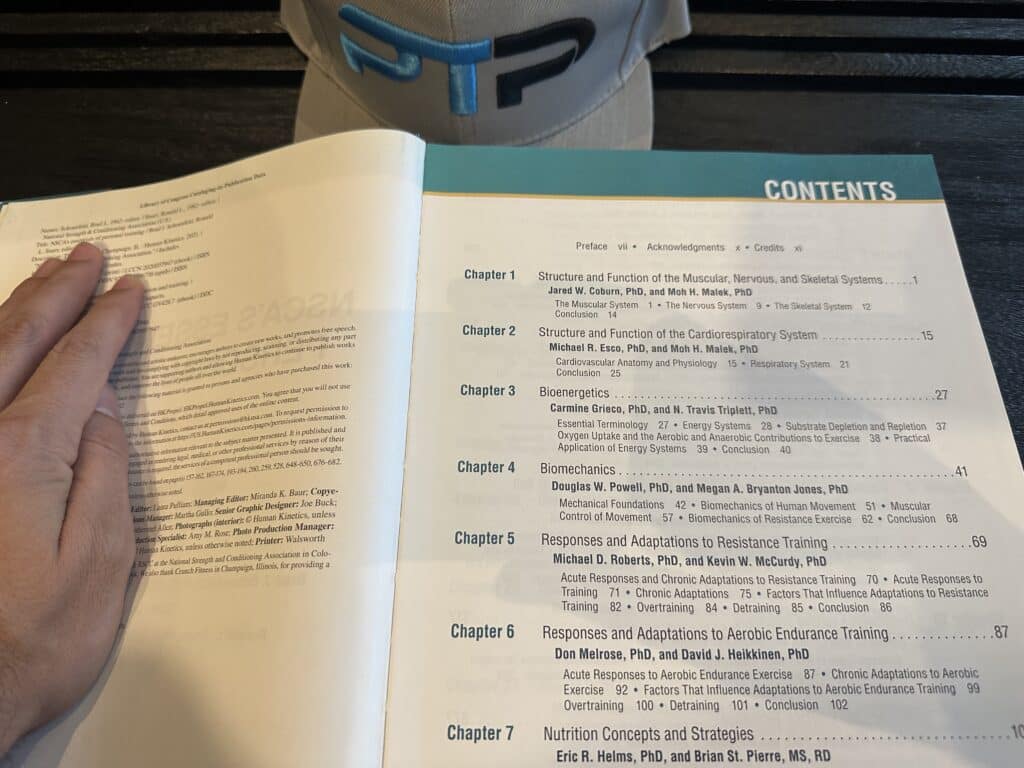
NSCA does an excellent job providing value and breadth of knowledge throughout its textbook and study manual.
This section focuses on the textbook’s inclusions, as it is the primary study material for anyone seeking to certify.
Exclusive PTP CPT Offers |
||
|---|---|---|
Most Popular Cert | Best Online NCCA Cert | Best Study Materials |
Gold Standard Cert | A Good Option | Best CPT for you?  |
The textbook for the CPT certification is known as The Essentials of Personal Training. This book includes a wide array of materials and an excellent focus on strength and conditioning.
Regarding the breakdown, the book has 25 chapters spread across over 600 pages. This may sound overwhelming, but I believe that it has one of the best layouts of any personal training textbook.
Each chapter has a well-defined and unique topic so that you can track down the exact thing you may be searching for when studying.
Here are the titles for the 25 chapters in the NSCA Essentials of Personal Training textbook:
- Chapter 1 – Structure and Function of the Muscular, Nervous, and Skeletal Systems
- Chapter 2 – Cardiorespiratory System and Gas Exchange
- Chapter 3 – Bioenergetics
- Chapter 4 – Biomechanics
- Chapter 5 – Resistance Training Adaptations
- Chapter 6 – Physiological Responses and Adaptations to Aerobic Endurance Training
- Chapter 7 – Nutrition in the Personal Training Setting
- Chapter 8 – Exercise Physiology for the Personal Trainer
- Chapter 9 – Client Consultation and Health Appraisal
- Chapter 10 – Fitness Assessment Selection and Administration
- Chapter 11 – Fitness Testing Protocols and Norms
- Chapter 12 – Flexibility, Body Weight, and Stability Ball Exercises
- Chapter 13 – Resistance Training Exercise Techniques
- Chapter 14 – Cardiovascular Training Methods
- Chapter 15 – Resistance Training Program Design
- Chapter 16 – Aerobic Endurance Training Program Design
- Chapter 17 – Plyometric and Speed Training
- Chapter 18 – Clients Who Are Preadolescent, Olderm or Pregnant
- Chapter 19 – Clients With Nutritional and Metabolic Concerns
- Chapter 20 – Clients With Cardiovascular and Respiratory Conditions
- Chapter 21 – Clients With Orthopedic, Injury, and Rehabilitation Concerns
- Chapter 22 – Clients With Spinal Cord Injury, Multiple Sclerosis, Epilepsy, and Cerebral Palsy
- Chapter 23 – Resistance Training for Clients who Are Athletes
- Chapter 24 – Facility and Equipment Layout and Maintenance
- Chapter 25 – Legal Aspects of Personal Training
This is unique as some personal training textbooks will not separate training styles to a great enough degree, and if you need to find something, it may feel like it could be in any number of chapters.
You will have no problem pinpointing everything you need and distinguishing the materials found in each chapter.
Let’s dive into each of the seven categories I look at to see what NSCA does right and wrong for each.
Exercise Science Foundations
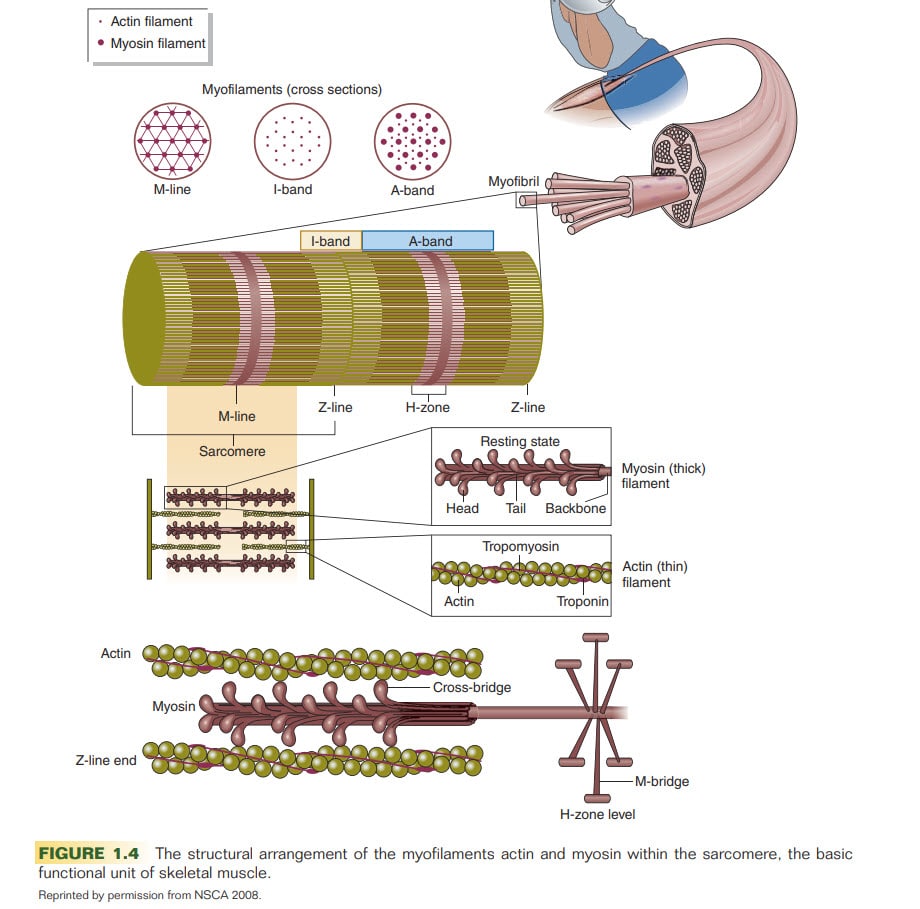
The foundations of exercise science are perfectly covered within this textbook. This organization is as good as they get compared to other CPT certifications.
There is extensive coverage of topics like biomechanics, bioenergetics, physiology, and more.
The groundwork laid by the textbook in terms of exercise science is exactly what should be strived for by all other organizations.
Not only is it perfect in this category, it even adds a lot of foundations that will be used in other certifications like nutrition and strength and conditioning. You get more than your money’s worth regarding exercise science topics.
There are a total of 8 chapters spanning one-fifth of the book to go over exercise science. This should be a major focus in studying for the exam, and it can be quite a challenge for people without experience in the field.
For example, you go into great detail regarding things like Muscle Fibers or Krebs Cycle. You need to know things as specific as the breakdown of muscle fibers and myofilaments, all the way to the input and output of the Krebs cycle.
It can get quite specific, which is very good for a personal training textbook.
Behavioral Coaching
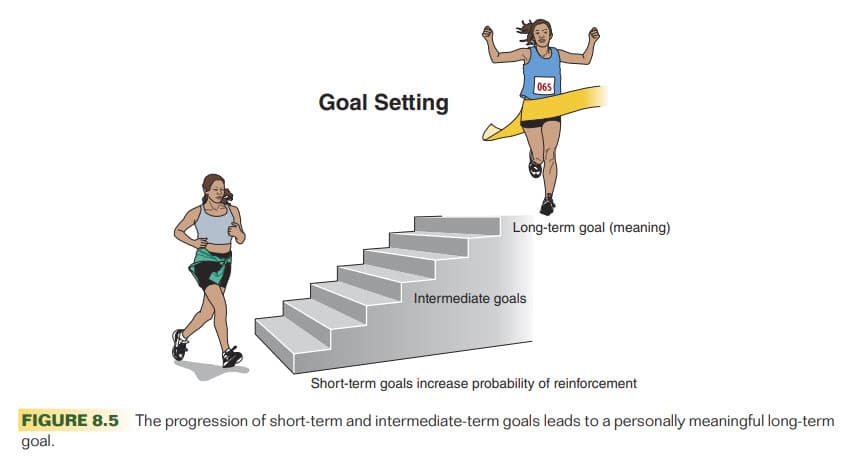
This is the least valued section of the study materials and something I would like to see expanded in the future for NSCA’s CPT certification.
They do well with the section that connects to this, which is client screening, but this certification is lacking when it comes to helping future trainers with their coaching and goal setting.
In my opinion, this is easily offset by the level of expertise and knowledge they have in all other sections, but it should be noted that this part of the text is sparse.
Chapter 9 is the only location where this is focused, and it is not long before they skip right to the health appraisals and screenings.
This section has received the lowest score of all sections in my grading, which is a 3/10.
Client Health Screening
Client Health Screening gets a good amount of coverage and emphasis on all of the documents needed for various scenarios personal trainers run into.
You can find all the mentioned documents throughout the text and online. They are easy to understand, and the textbook nails down their uses and the importance regarding the personal training scope of practice and connections with other medical professionals.
It is great to see the importance of medical clearance and how many options and scenarios exist for health screening.
This section connects directly to the next section, which is on movement screening. Both screening sections are in the same domain in this textbook.
Movement Screening
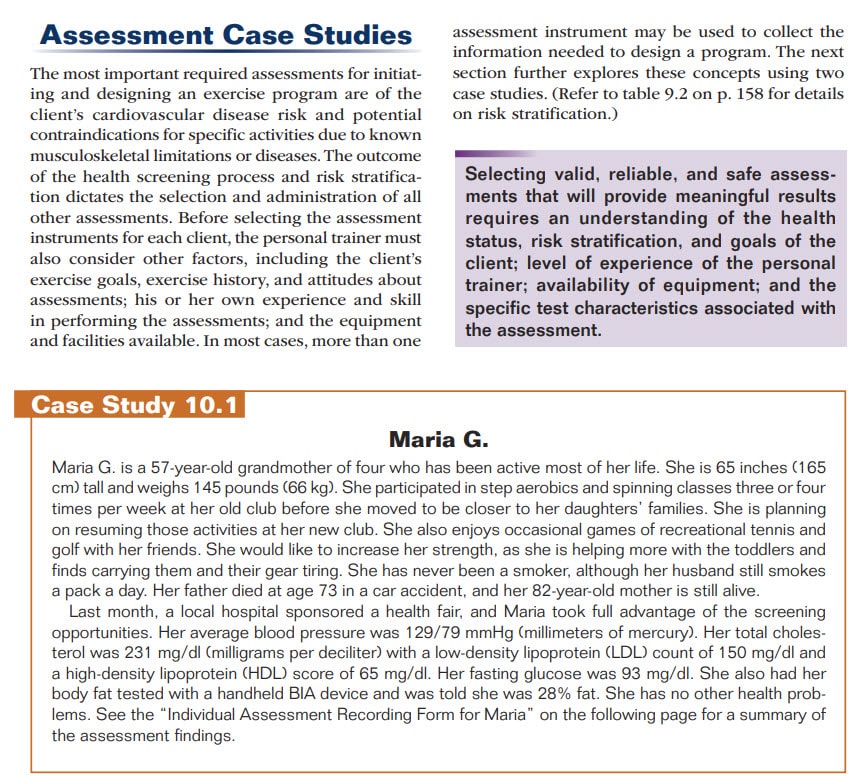
Movement screening continues right after the textbook starts the health screening section, and it has great importance in this area.
The level of focus NSCA has on training athletes has really allowed the organization to get movement screening down and perfect in text form.
Not only do they have chapters focusing on proper fitness assessment and exercise technique, but they also go into detail about the proper selection and administration of these screenings of movements.
It is a perfect example of how a training organization should screen its clients. You get all the tools.
They even touch on how these topics could look different for various populations, and that can help guide future personal trainers and will easily transfer over to their career with clients.
There are many exercises they describe in great detail; for example, look at this picture describing the supine hip lift above.
This would usually be an exercise that would not get a dedicated section in a fitness textbook, but that shows how detailed they get.
I must add that the detail for movement screening and exercise technique only improves when looking at NSCA’s 3rd Edition Exercise Technique Manual. This piece of study material completes this section.
This material also assists in injury prevention by knowing a person’s movement history. Human Kinetics is an important aspect of training that not all certs get downright.
Resistance and Aerobic Fitness Training
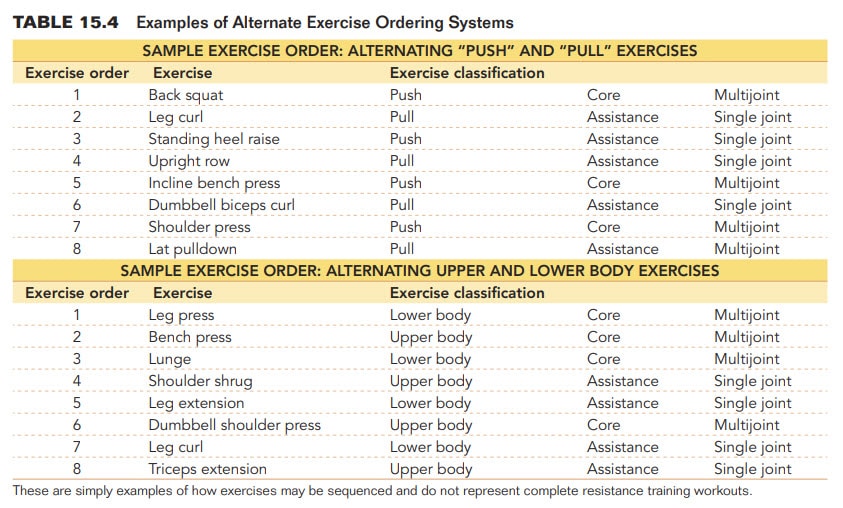
Resistance Training and Aerobic Fitness Training are both excellently taught in the Essentials of Personal Training Textbook. They both get more than one chapter and this aids in finding specifics about both training styles.
The amount of detail and importance placed on resistance and aerobic fitness training is outstanding.
The textbook even goes as far as differentiating the training for the general public and the work that should be done with athletes. Normally, in a personal training textbook, you would only see the general public mentioned, as this is the typical audience for this certification.
But, due to the NSCA and their close relationship with strength and conditioning, athletes get the focus in this CPT certification. This is a shining example of both forms of training done right in NSCA personal training.
If I changed anything, it would be to label the advanced aerobic fitness chapter, the plyometric and speed chapter, equal to the resistance training for athletes chapter. The naming makes it slightly inconsistent, but the material within aligns with the intent.
Special Population Training
The training of Special Populations is done well. Perhaps this is even better than other certifications because specific populations and conditions are grouped into separate chapters.
Usually, one chapter is dedicated to special conditions deviating from the general population, but NSCA and their CPT certification chose to make this into six different chapters.
The material here ranges from personal training for seniors to any population group with special considerations or contraindications regarding exercise.
The value here is excellent and will help any personal trainer develop the skill to cater to the specific needs of their clients with more individualized programming needs.
NSCA Nutrition
NSCA sets a solid standard for nutrition in CPT certifications. They don’t have their own nutrition certification, like most other organizations.
The other CPT programs that compare to NSCA all have their own nutrition certifications and specializations. Thankfully, this does not register as a negative for NSCA unless a person specifically wants their CPT and nutrition certs to be from the same company.
NSCA stays well within the practice scope for trainers and ensures that all learners know what they can and cannot do for their clients in nutrition terms.
From there, they teach all of the basics that trainers will come to hear from their clients.
These are the topics like weight gain/loss, dietary choices, and topics on supplementation.
Trainers are not likely to have any problems when it comes to nutrition advice and consultation. They may even be inspired by the information in this certification to go on and get specialization in the area.
Now, let’s see how the certification exam preparation is handled.
NSCA CPT exam prep and study materials
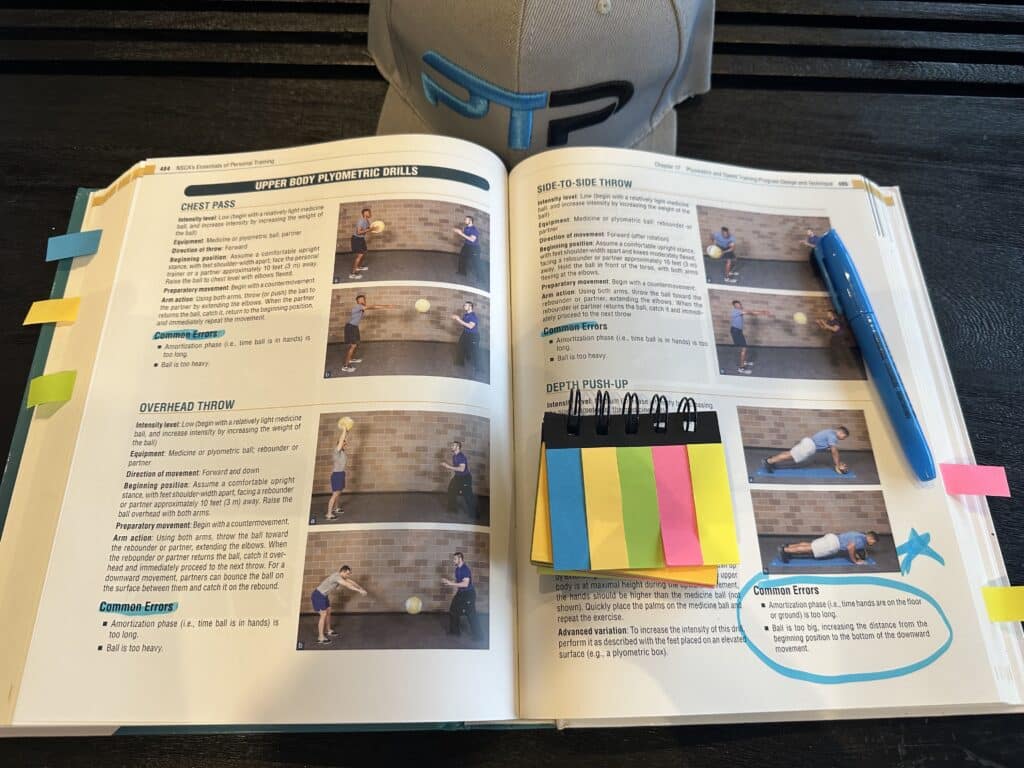
In my experience, even the most comprehensive study materials from NSCA do not fully match those of ACE or NASM.
The practice test and questions are super solid, but you just don’t get as much hand holding in regards to preparing for the exam. While other organizations give you modules to follow along with the course material or audio guides to help synthesize the content, NSCA gives you a basic study guide and that’s it.
This works fine and you can basically just study the textbook, which is kind of what I like to do anyway, although be prepared to spend a few months prepping, as the book is over 600 pages long. I’d recommend making your own content outline from your studies for complete understanding.
I personally used the Trainer Academy NSCA CPT MVP Study Package, which included a ton of great materials like spaced-repetition flashcards, practice quizzes and tests, and a complete study blueprint and simplified guide at a vastly reduced cost compared to the full-price official NSCA study packages.
Plus, if you do fail your NSCA exam, Trainer Academy offers a full refund.

- Complete curriculum study preparation
- Audio guide, flashcards, and mnemonics
- 800+ practice questions
- Highest exam pass rate
- Exam pass refund guarantee
- Cheaper pricing than ACSM materials

- Curriculum study preparation
- Video and written curriculum included
- Textbook purchased separately
- 200+ practice questions
- No exam pass refund guarantee
- $300+ for textbook and prep course (exam not included)
NSCA personal trainer requirements
Let’s see some of the basic requirements that are needed for Certification from NSCA for their CPT certification:
- You will need to be at least 18 years old
- You should have obtained a high school diploma, or an equivalent, like a GED
- You need to have valid documentation readily available for the exam
- AED and CPR certification is required; no alternatives to them
NSCA-CPT salary
Average trainers certified through the NSCA CPT earn $49,739 according to ZipRecruiter data. This is in-line with other major CPT salaries. Your income reflects your overall talent and experience as well as who you get your cert from.
You could also look at the NSCA CSCS, as strength and conditioning coaches can make a lot more than trainers depending on where they work.
Taking the NSCA-CPT exam
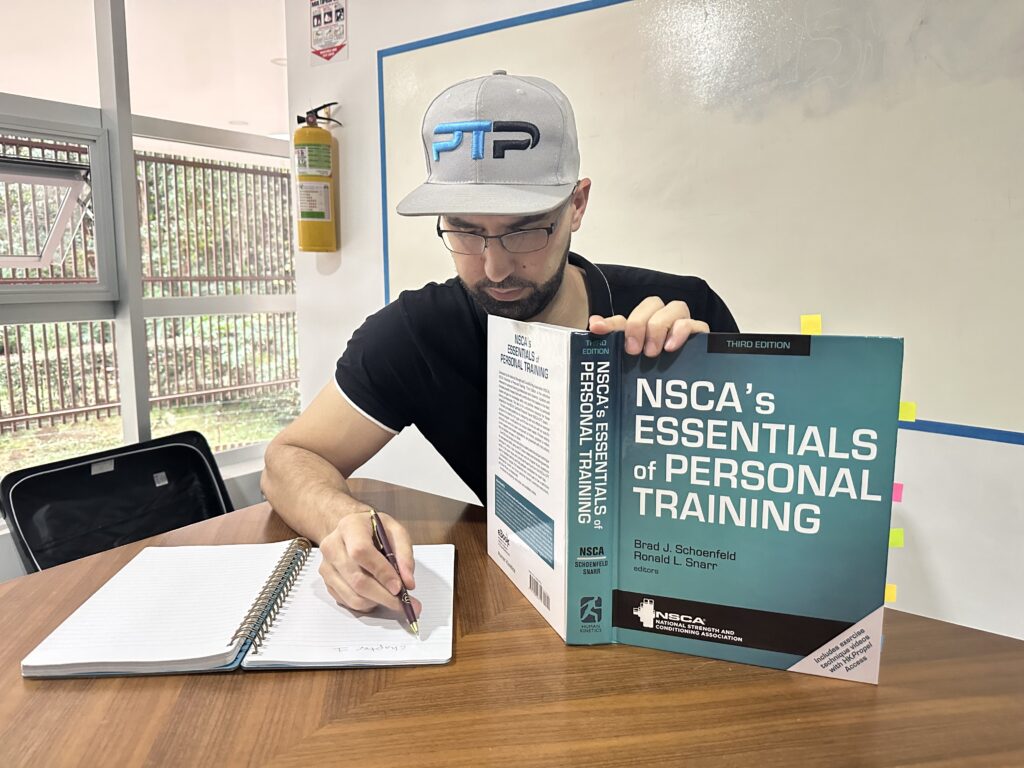
The NSCA CPT exam consists of 140 scored questions and 15 non-scored questions used for future testing purposes. This must be done within 3 hours.
The exam looks to test the candidate and their knowledge and ability in these four domains:
- Client consultation/Fitness Assessment (23% of the test)
- Program Planning (32% of the test)
- Techniques of Exercise (31% of the test)
- Safety, Emergency Procedures, and Legal Issues (14% of the test)
The NSCA-CPT test has at least 25 videos or pictures of CPT test questions to examine knowledge across multiple domains.
The pass rate for the test as of 2019 was 72%. This is much higher than their strength and conditioning certification, but still not even close to a guarantee of passing the exam.
You want to ensure you are as prepared as possible for this certification exam, as the NSCA CPT exam questions can be challenging.
You need to wait 90 days before you are allowed to retake the CPT certification exam.
It is good to seek out NSCA practice exams to get a feel for the question styles and how you must study during the exam preparation.
PTPioneer offers an NSCA CPT practice exam for free on the site.
NSCA continuing education and recertification
Recertification for the NSCA organization is slightly different than with other training certifications.
They operate on a three-year period for recertification, so you need to know when you are getting your certification within the entire three-year period.
For simplification purposes, you need about 2.0 Continuing Education Units or CEUs. CEUs must be achieved by qualified organizations that the NSCA deems worthy.
Essentially, 2.0 continuing education units will boil down to approximately 20 hours of attendance for a class of some kind, 2 hours of presenting for a certification class, or a mix of set hours for publication authorized by the NSCA.
You must report the hours to the NSCA for approval, making the entire process a bit more complicated than all other organizations. Still, once you are reporting your attendance hours, presentation hours, and publications, it becomes much easier.
Knowing where you can get some easy CEUs for recertification is always a good idea, especially when the time is getting close.
The organization also offers its own NSCA CEU courses for people to look into.
Make sure to check the official NSCA website for the most current and accurate recertification requirements.
Other NSCA offerings
This is a list of other courses from NSCA:
- Certified Strength and Conditioning Specialist (CSCS)
- Certified Performance and Sports Scientist (CPSS)
- Certified Special Population Specialist (CSPS)
- Tactical Strength and Conditioning Facilitator (TSAC-F)
Taking these courses gives you extra credentials to add to your name and CEUs, so picking up one of these is a great individual approach towards recertification.
NSCA Personal Training Certification program overall rating
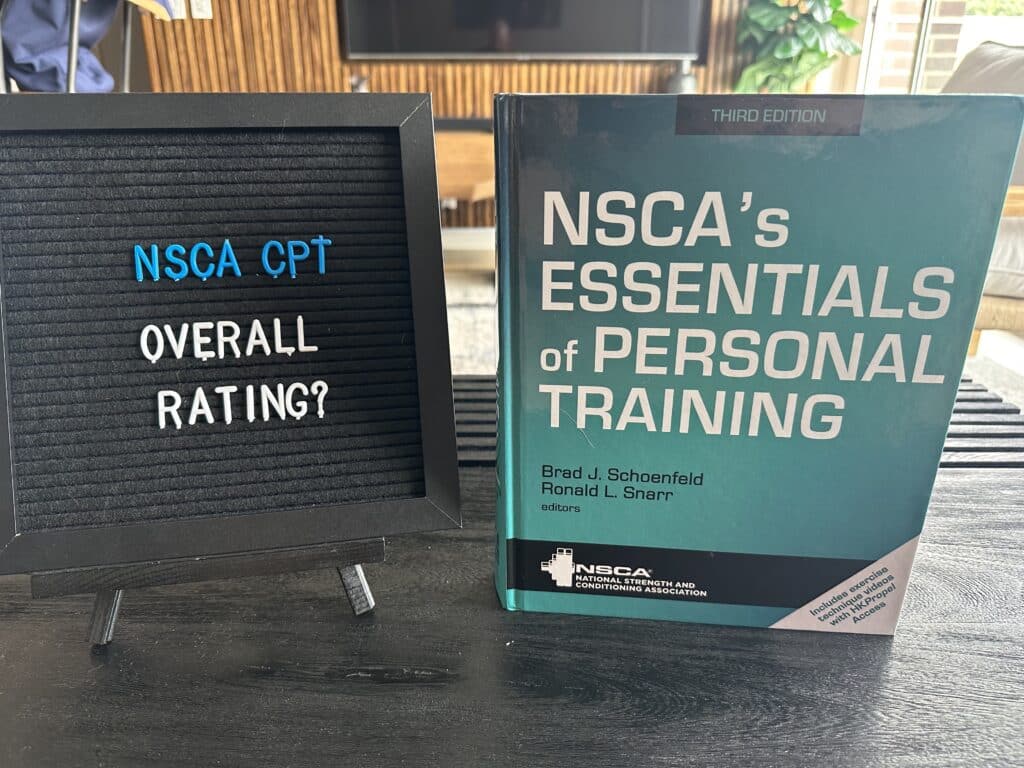
[rank_math_rich_snippet id=”s-d0d859cd-17df-43f2-9f78-9e489e14f129″]
Overall, I rate the NSCA CPT a 9 out of 10. It is a very competent certification with excellent information for any new trainers. The organization is extremely respected and the price for the CPT is quite reasonable. However, the study resources are lacking compared to other programs like those of ISSA, NASM or ACE, so I can’t give it full marks.
The NSCA personal trainer certification is still very good and can lead to advanced certifications more easily. There is even a solid market for small group personal training for those certified with the NSCA CPT.
The NSCA is one of the top organizations in the industry, up there with NASM and ACE, but they are known more for their Strength and Conditioning certification.
Thankfully, their CPT certification deserves the same level of respect and even stands out from the competition in its exercise foundations, resistance training, and special population training aspects.
The pros and cons of NSCA definitely weigh in favor of the pros. It is one of the best personal trainer certifications on the market.
This certification is near perfect if it includes more behavior coaching within its programming and also refines some screening aspects to stand out.
The NSCA CPT is not the best that we have reviewed, but it does ok against certifications when we compare, like NSCA vs ISSA, or NSCA vs ACE.
I hope this NSCA certification review of this absolutely solid CPT cert has helped you decide on your future personal trainer career.
NSCA CPT Frequently Asked Questions (FAQ)
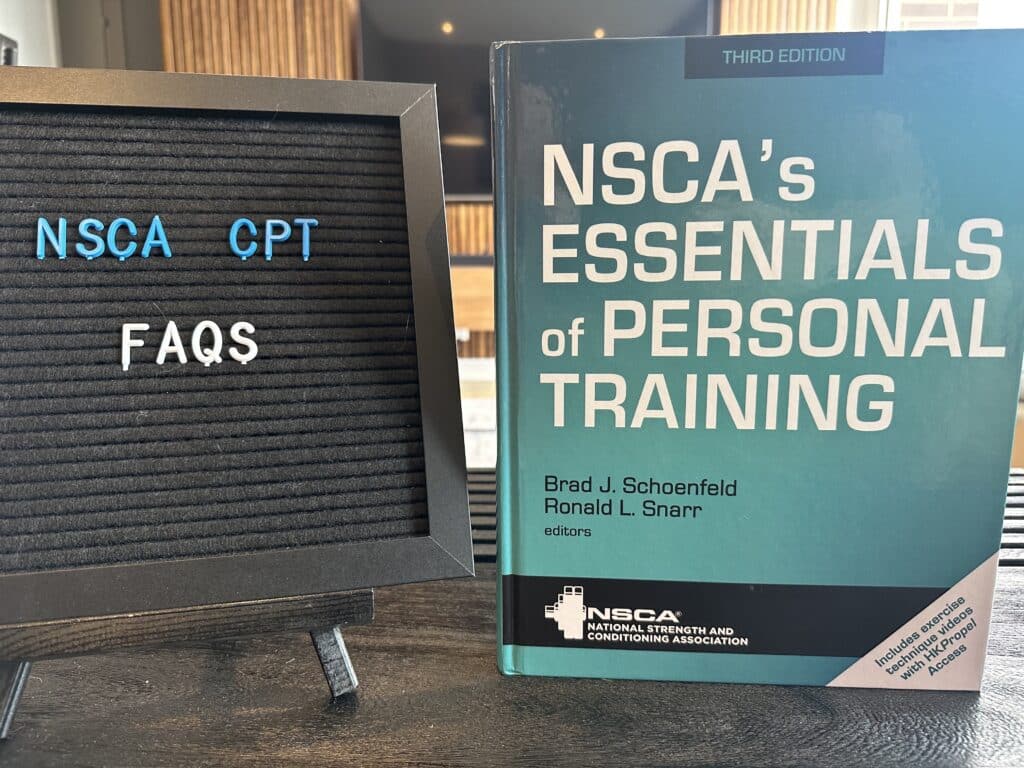
What is NSCA?
What certifications does NSCA offer?
– NSCA-Certified Personal Trainer(NSCA- CPT)
– Certified Strength and Conditioning Specialist(CSCS)
– Certified Special Population Specialist(CSPS)
– Tactical Strength and Conditioning Facilitator(TSCF)
– Certified Performance and Sport Scientist (CPSS)
How much does the exam for the NSCA CPT cost?
What is the pass rate for NSCA exam?
How do I get NSCA CPT certified?
– Select the certification of your choice
– Register for your exam
– Choose a location
– Take the exam after registration and before it expires
– Pass the exam and become an accredited NSCA Certified personal trainer
– You are required to have your CPR/AED card before the exam. You should be 18 years – and above and have your ID.
How do I become an NSCA Strength and Conditioning Specialist?
You must have a Bachelor’s degree or be currently enrolled as a college senior at an accredited institution.
How hard is the NSCA CPT exam?
How long does NSCA certification last?
Recertification attracts extra fees.
What is NSCA Personal Trainer Salary?
Does NSCA provide study materials and other resources?
There are study packages that you can choose from, which range from $29.95 to $567.
You can visit my home page for the full NSCA study guide, practice tests, flashcards, and many more.
Does NSCA provide Internships?
Is NSCA a good certification body?
Check my home page for information on the top-rated personal trainer certification bodies.
What is NSCA’s contact information?
For generation inquiries, you can send an email to; [email protected]

 Have a question?
Have a question? 

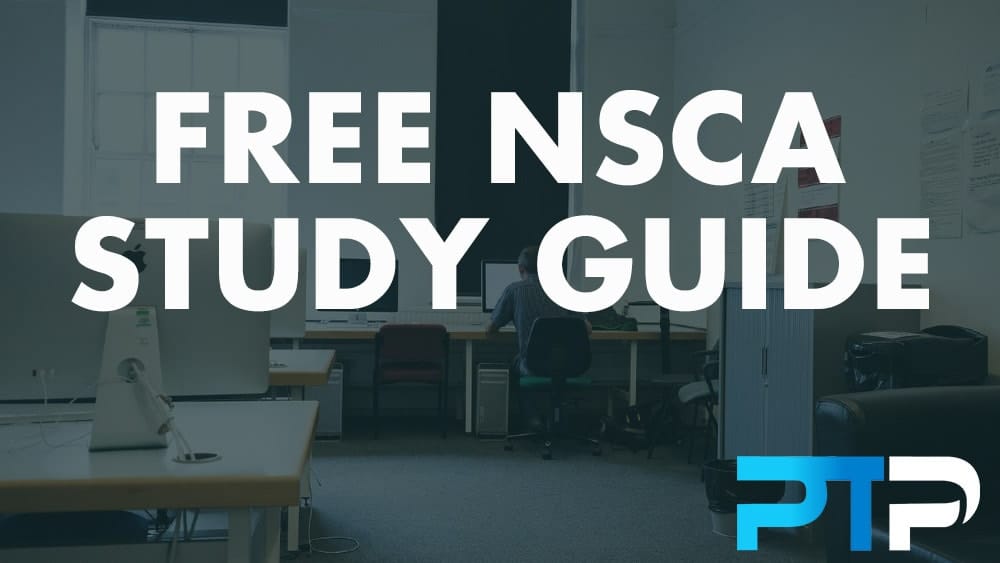

Hello! Do I have to buy the NSCA textbook in addition to the Trainer Academy MVP study package? I had been certified by NASM for 14 years but I accidentally let my certification expire so I am redoing my certification. Thanks!
Hey Miki, I do not for with Trainer Academy and cannot recommend what you should do to study in these cases, but I do stand by their useful study materials. You should talk with the support on their website for some guidance. Also, if you are redoing your NASM certification, make sure to check out the NASM CPT and not the NSCA CPT. Best of luck to you in your certification journey.
hi Tyler,
so you need a 70% or better on the NSCA CPT test or a 70 total questions right out of 140?
Hey Alec,
You need to score 70% of all of the 140 questions on the NSCA personal training exam. This would equate to approximately Answering 98 questions out of the 140 correctly. I hope this helps
Hi Tyler,
I am looking to get into the field but I don’t have a college degree. If I were to earn my NSCA – CPT certification, how sufficient would that qualification be alone? Based on your insight of the industry, do you see many people without a degree excel in this industry?
Hello,
you do not need a college degree in order to get the general certified personal training certification from the national Strength and conditioning Association. They only require a four-year college degree if you are trying to get there more advanced CSCS certification. But you really do not need this in less you are planning on working purely with strength and conditioning clients/athletes. And yes, I know a ton of personal trainers that I work with that do not have college degrees but are doing fantastic in the industry both in terms of overall recognition as well as how much money they make. Having a degree is not necessary to become an excellent personal trainer. It’s much more about how you apply yourself and continue your education on your own.
Thank you, I appreciate your reply. This was really helpful and encouraging!
Hi Tyler thanks for such a great informational site! Great job. I will make sure to use on of your links for a discount code. I am considering signing up for the CSCS certification. I don’t have a science background (MBA in Marketing), I am an avid runner; Spartan racer and I adore the gym 😉 – My question is whether it is realistic to be ready to take the exam in 4 months from the time I start studying (2 to 3 hours a week). Somehow this info is hard to find online. Thanks a million. Isabelle
Hey Isabel,
The certified strength and conditioning specialist certification from the National strength and conditioning Association Is definitely one of the most prestigious personal training certifications. It does have a strong focus on sports performance though as it is a strength and conditioning certification as opposed to a general certification such as their general NSCA CPT. Most people go the route of getting their general certification before getting there more advanced CSCS but the route is totally up to you and the CSCS certification is a fantastic certification. In terms of the time. It should take you to study for and pass the exam, you can definitely do it in four months. You just need the right direction for how to study. I do know that our good friends over at trainer Academy have a 16 week study blueprint that you can follow. This seems right up your wheelhouse as four months is your exact time frame for studying. I suggest checking them out as they have a fantastic study guide, practice tests, flashcards and more. https://traineracademy.org/nsca-cscs/ Good luck with all the studying!
How many CEUs is getting the CSCS certification? Can I renew my NASM CPT with a CSCS?
Hello,
Getting the certified strength and conditioning specialist certification is definitely enough continuing education in order to renew your NASM CPT. They only require 1.9 continuing education units which is equivalent to approximately 19 hours plus one hour for CPR and AED training in order to get recertified. This is definitely more than sufficient.
Hello Tyler,
I live in Australia and wanted to know if NASM will be recognised here to help me work in the industry. Also, would you recommend getting the NASM CPT before doing CES?
Thanks
Kedar
Hello Kedar,
All I know is that NASM is recognized all throughout the United States and in some parts of Europe. I cannot tell you if your local employers will accept the NASM certification. You will need to go ask them which certifications they accept and which ones they prefer. I hope this helped